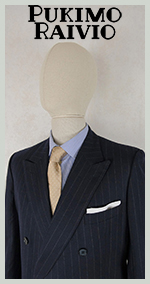An Interview with Bespoke Shoemaker Adam Law
0March 19, 2025 by Ville Raivio
Products from Pukimo Raivio
 |  |
|---|---|
Cesare Attolini, light tweed jacket, size 50 EU
VR: Your age and occupation?
AL: I’m 43, a shoemaker, and I’m running my own business.
 VR: Your educational background?
VR: Your educational background?
AL: I took a foundation diploma in Art and Design, then went on to study Fashion and Textiles at Brighton University.
 VR: Do you have children or a spouse, and how do they relate to your shoe enthusiasm?
VR: Do you have children or a spouse, and how do they relate to your shoe enthusiasm?
AL: I’ve got two daughters, 12 and 9. I’m divorced but in a happy relationship now—nearly three years together. My kids think what I do is boring. They reckon my shoes should be more colourful, more exciting. Maybe they’re right—maybe the market does want rainbows and stars on bespoke shoes.
 VR: How did your parents and siblings react when you decided to become a shoemaker?
VR: How did your parents and siblings react when you decided to become a shoemaker?
AL: My dad worked at Sheerness Docks, and my mum was disabled and so a housewife. I have an older brother who studied maths and is now working in banking. Creativity wasn’t really a thing in our house, so I had to figure it all out myself. But they were proud I found something I loved, even if they didn’t fully understand it.
 VR: What other hobbies or passions do you have besides footwear?
VR: What other hobbies or passions do you have besides footwear?
AL: Painting, music, and generally getting obsessed with things. I’ll fixate on a song, a film, or an artist and just disappear into it. The way a painter uses a brushstroke to suggest something instead of spelling it out—that’s magic. I try to bring that same energy to shoemaking. Less is more. How can I be conservative with my knife cuts and get it to flow seamlessly, effortlessly?
 VR: How did you first become interested in shoes, and when did you turn toward artisanal shoemaking? Why classic models instead of fashion?
VR: How did you first become interested in shoes, and when did you turn toward artisanal shoemaking? Why classic models instead of fashion?
AL: It all started during university. I did a sandwich degree, so my third year was spent doing work experience. I ended up at Paul Harnden Shoemakers, and that was my first real taste of shoemaking—it stuck. When I went back for my final year, I told my tutors I was focusing on shoes. They weren’t happy, but it didn’t matter—I knew what I wanted to do.
As for why classic shoes instead of fashion? Classic is rebellious in its own way. It’s about doing something so well that it doesn’t need to change.
 VR: How did you acquire your knowledge of the craft—through books, in-house training, workshops, or something else?
VR: How did you acquire your knowledge of the craft—through books, in-house training, workshops, or something else?
AL: After graduating, my first job was working on leather interiors for Rolls-Royce—nearly two years making the Phantom. Beautiful work, but every car was the same, just in a different colour. So I left, intent on getting into shoemaking. I moved to London and spent six months knocking on doors before I got offered a place to train at G.J. Cleverley. I stayed there for nearly 17 years, learning the art of bespoke shoemaking the old-school way.
I learned by watching, by doing, by cutting things apart to see how they were made. Learning the details that make a shoe last decades instead of just seasons. I’ve read a lot of books, but books can’t teach you how leather moves, how it breathes. You have to feel it.
 VR: How would you describe the house style of Adam Law Footwear?
VR: How would you describe the house style of Adam Law Footwear?
AL: Right now, I make traditionally built English shoes—classic, but never boring. I’m also working on designs that reflect more of me—shoes with character, with a bit of soul.
VR: Do you have a favorite shoe model and leather type?
AL: I don’t have a favourite model—what I love is when a shoe just works for the person wearing it. That moment when they put it on, and you can tell it’s theirs. That’s the best part. For myself, I live in Chelsea boots. Easy to wear, comfortable, and a great way to show off toe shape and leather quality.
VR: There are several fine shoemakers in England. Why should my readers try you?
AL: If you want to order from a company where you’re just another name in the book, I’m not your guy. If you want someone who actually listens, who takes the time to understand what you want, then we’ll get along just fine.
Shoemaking is a relationship. The first pair is just the beginning. Each one after that gets better because we learn more about what works for you. It’s a process, and it should be fun. I want you to love wearing your shoes, not just admire them from a shelf.
 VR: What is your definition of a well-made shoe?
VR: What is your definition of a well-made shoe?
AL: Longevity. Fit. A shoe you actually want to wear, not just something that looks good in a box. A well-made shoe lasts, but more importantly, it lives—creases in all the right places, molds to your foot, gets better with age.
VR: Who or what inspires you?
AL: Anything and everything. Paintings, music, film, food. I collect records—I love Joy Division, My Bloody Valentine, ESG, Liquid Liquid. Post-punk, no-wave, rare gems nobody knows.
I remember the first time I saw Pulp Fiction—it blew my mind. The way Tarantino plays with structure, the way the dialogue crackles. The way an old piece of furniture has been worn down by a hundred years of use. The way a single brushstroke can suggest an entire figure. That’s the stuff that gets me. The details.
 VR: Finally, what, in your view, is a British shoe? How does it differ from a handmade French, German, or Italian shoe?
VR: Finally, what, in your view, is a British shoe? How does it differ from a handmade French, German, or Italian shoe?
AL: A British shoe is solid, structured, and built to last—welted, refined. French shoes have a similar construction but tend to have rich patina finishes. Italian shoes normally look longer, narrower, flashier—usually Blake-stitched, which makes them lighter but not as durable. German shoes tend to be Heavy-duty, double-stitched, built like tanks.
British shoes have that balance—elegance, but with substance. That’s what I make.
Pictures: Adam Law
Category Cordwainers, Footwear, Interviews | Tags:




Leave a Reply